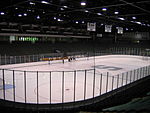The Jack Breslin Student Events Center is a multi-purpose arena at Michigan State University in East Lansing, Michigan. The arena opened in 1989, and is named for Jack Breslin, MSU alumnus, former athlete and administrator, who first began pushing for the arena in 1969. It is home to the Michigan State Spartans men's and women's basketball teams. Although it nominally contains 16,280 seats, the arena typically holds around 10,000 for most events depending on the floor or stage setup. The Breslin Center superseded Jenison Fieldhouse, which stands approximately 400 feet (120 m) to the northeast, which had served since 1939. In 2022 the women's volleyball team moved its home games from Jenison to the Breslin Center.
The arena's previous basketball court was the same floor where the Spartans won the 2000 NCAA Men's Tournament, which was at the RCA Dome in Indianapolis. The school purchased the floor from the NCAA and Final Four floor installer Horner Flooring (based in Dollar Bay) after the title game, and had a plaque installed on the baseline near the Michigan State tunnel to commemorate the floor's purpose in the school's history. They updated their court before the 2016–2017 season that has a two-toned finish inside the arcs and a large Spartan Head in the middle.
The building not only serves as the home to MSU sports teams, but as the main large performance arena for the Lansing area. The Michigan State Bar Examination, large concerts, commencements, monster truck rallies, and circuses that travel to Mid Michigan are often held at the Breslin Center. With a large arena, it is Lansing's WWE venue. Many events for Michigan State are held here, including a plethora of career fairs and many Greek Life events.
The arena underwent a $50 million renovation starting in January 2016 that went until October 2017. This renovation changed many things about the Breslin, but the most notable was the addition of the Tom Izzo Basketball Hall of History. This addition includes both men's and women's basketball trophies throughout the years, along with tributes to notable former players, previous jerseys, and even a wax figure of Tom Izzo. Another notable addition, donated by Draymond Green, was a new weight room for the players. Other things included in the renovation were a locker room for former players, a players' lounge, and a recruiting room. The concourse was also widened, and improvements were made to the restrooms and concession stands for the benefit of the fans. Quicken Loans founder, Dan Gilbert, donated $15 million to both the addition and a scholarship fund. They named the outside of the Hall of History the Gilbert Pavilion in his honor.











